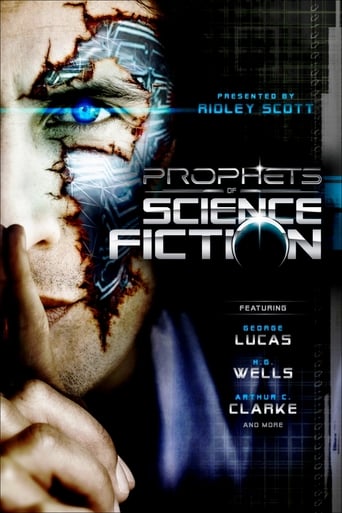Tony Higgins
A weak series that presents poorly researched and over-stretched interpretations of the authors' works. As an example - it describes 'Starship Troopers' as Heinlein's most controversial work, ignoring 'Farnham's Freehold' (publishers won't reprint it) and 'Stranger in a Strange Land' (it took years to get published due to its content). It fails to acknowledge how many of the authors covered were noted for their detailed multi-work visions of the future - Heinlein's 'Future History' series, Clarke's linked stories, and the several series within Asimov's body of work.The series also pays scant attention to lesser-known works, such as critical short stories by Heinlein, Asimov and Clarke (among others), that would - if included - better illustrate the series' claim that SF authors have been effective futurists and predictors of social and technical development. To point out another Heinlein omission, 'where's Waldo?' Hint - ask anyone who works with hazardous material enclosures.Finally, why include Mary Shelley or George Lucas - who, despite their impact, have not produced a varied body of science fiction as authors? Instead, why not cover (for example) Theodore Sturgeon, whose work is much more predictive of both current developments and likely possible futures? Why not Harlan Ellison? Why not Spider Robinson?I had hoped for much more...
Erin Underwood
Prophets of Science Fiction by executive producer Ridley Scott is a new documentary series produced by the Science Channel–a series that hasn't received any of the attention that it deserves. The series takes on the work of eight science fiction authors, examines the science with the work, and then shows how it inspired scientists to develop new technologies.There really is little doubt that we are living in the age of science fiction. In the early days of science fiction, before the term science fiction even existed, Mary Shelley was writing a novel about a scientist who dreamed of reanimating a dead body. Then there was Well's inspired story about a man who wanted to travel through time and Asimov's vision of how robots could fit into mankind's future. Prophets of Science Fiction delves into the science fiction of the past and analyze it's affect on scientific developments that have come to be ordinary and commonplace in today's society."The "Science Fiction" of the past has now simply become "Science". And the science of the future was strangely prophesied by a group of visionaries whose dreams once may have deemed them renegades and "mad scientists," have become reality!"–The Science ChannelNot only is Prophets of Science Fiction fascinating from a science fiction lover's perspective, but it's educational as well. With mini interviews from today's top authors as well as cutting edge scientists, Ridley Scott creates a wonderful new series that erases the lines between science and science fiction. The series will leave you wondering what science fiction technologies being written about today will find their ways into our lives in the future. Whether you're into science or science fiction, you're going to love Prophets of Science Fiction.The first episode features the work of Mary Shelley and premiered in November 2011. Since then additional episodes include Phillip K. Dick, H.G. Wells, Arthur C. Clarke, Isaac Asimov, Jules Verne, Robert Heinlein, and George Lucas. If you missed any of the previously aired episodes, you can view them on the Science Channel's website, on the Science Channel, or OnDemand. It'll be fun to see what comes next in this new series. Kudos to Ridley Scott for a truly fascinating new series.




